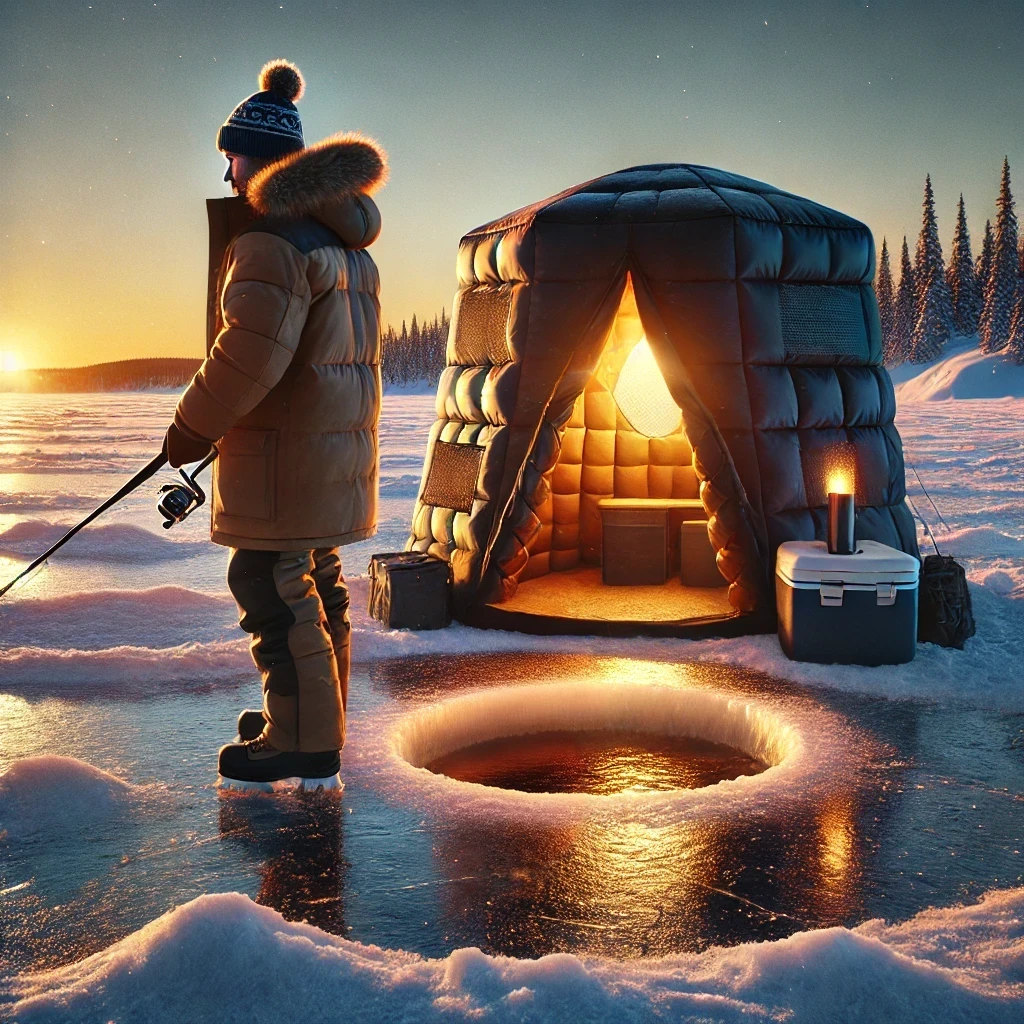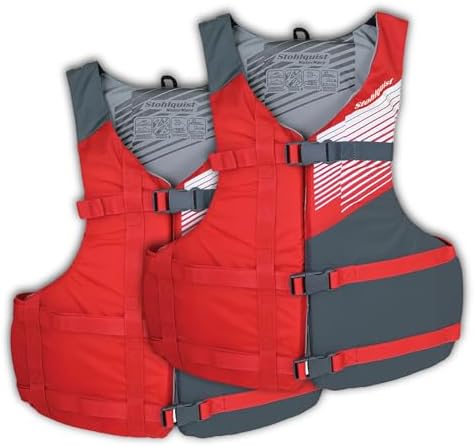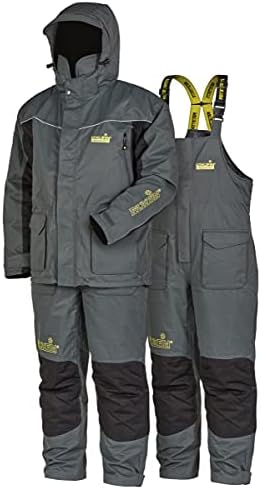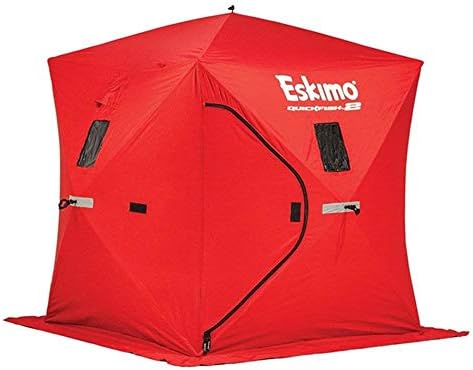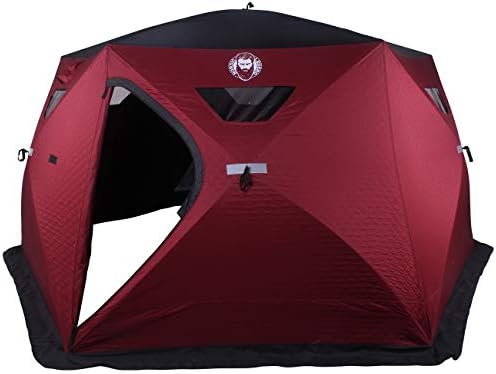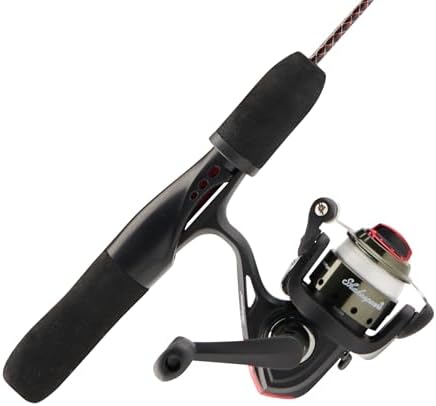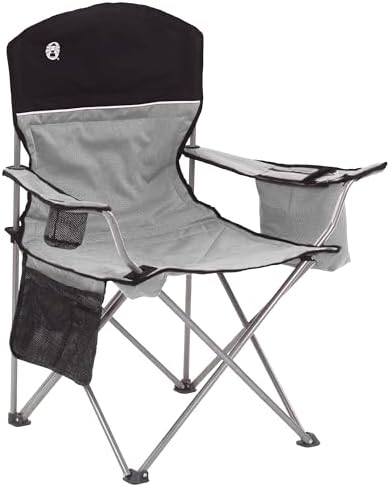Introduction
Ice Fishing is an exciting way to enjoy winter while testing your skills in a frozen environment. Imagine standing on a solid sheet of ice, drilling a hole, and patiently waiting for a fish to bite—it’s a thrilling challenge that rewards patience and technique. However, success in Ice Fishing isn’t just about luck. It requires the right Ice Fishing gear, safety precautions, and knowledge of fish behavior. This guide will walk you through everything you need to know, from choosing the best equipment to staying safe and catching more fish.
Without the right preparation, Ice Fishing can quickly become uncomfortable, unproductive, and even dangerous ❄️. But with proper planning and the right techniques, beginners can transform their experience into a smooth and enjoyable activity.
By following the advice in this guide, you’ll learn how to:
- Pick the best Ice Fishing gear for comfort and efficiency.
- Stay safe with essential precautions before stepping on the ice.
- Use effective fishing techniques to increase your chances of catching fish.
- Understand fish behavior in cold temperatures for better results.
Discover step-by-step secrets to turn your ice fishing adventure into a thrilling, unforgettable success.
Why Ice Fishing is an Exciting Winter Sport 🎯
Unlike traditional fishing, it requires patience, precision, and adaptability. You’re not just casting a line—you need to drill a hole, understand fish movement under ice, and adjust your tactics based on weather conditions. The thrill of feeling a subtle tug on your line while surrounded by a peaceful, frozen landscape is unmatched.
🔹 Patience: often involves waiting for fish to strike. The cold environment makes fish less active, so persistence is key.
🔹 Precision: Locating the best fishing spots requires knowledge of underwater structures, fish habits, and sometimes even sonar devices.
🔹 Adaptability: If one spot isn’t productive, moving around and testing different depths and baits is essential.
These three factors separate successful Ice Fishers from those who struggle. Knowing when and where to drill your hole, as well as how to entice fish with the right bait and lures, can make or break your fishing trip.
Ice Safety: The Most Important Rule ⚠️
Before stepping onto any frozen surface, checking ice thickness is critical for safety. Never assume the ice is safe just because others are fishing on it. Weather changes, underwater currents, and snow layers can all affect ice stability.
🔴 Safe Ice Thickness Guidelines:
| Ice Thickness | Safety Level |
|---|---|
| 2 inches (5 cm) | ❌ Too thin! Stay off. |
| 4 inches (10 cm) | ✅ Safe for walking. |
| 5-7 inches (13-18 cm) | ✅ Safe for ATVs and snowmobiles. |
| 8-12 inches (20-30 cm) | ✅ Safe for small vehicles. |
| 12-15 inches (30-38 cm) | ✅ Safe for trucks. |
Essential Ice Safety Gear 🛟:
🧊 Ice Picks: Used for self-rescue if you fall through the ice.
🪢 Throw Rope: Helps pull someone out of icy water from a safe distance.
🦺 Flotation Suit: Provides buoyancy in case of an emergency.
🥾 Traction Cleats: Prevents slipping on slick ice surfaces.
🧥 Layered Clothing: Protects against hypothermia in extreme cold.
Following these safety guidelines ensures a safe and enjoyable experience. In the next section, we’ll dive into the essential Ice Fishing gear you need to get started, from shelters to augers and specialized fishing rods. 🏕️
Secret 1: Essential Ice Fishing Gear You Can’t Go Without
Now that you understand the basics of Ice Fishing and the importance of safety, it’s time to gear up for success. Having the right gear can distinguish between a frustrating, cold day on the ice and a comfortable, productive fishing experience. Here’s a breakdown of the must-have equipment every beginner should invest in.
🏕️ Ice Fishing Shelters: Stay Warm & Protected
One of the biggest challenges in Ice Fishing is battling the harsh cold and wind. A high-quality shelter protects from extreme weather, keeping you warm and allowing you to fish comfortably for extended periods.
- Pop-Up Shelters: Lightweight, portable, and easy to set up. Ideal for beginners.
- Flip-Over Shelters: Offer built-in seating and insulation, great for frequent movement.
- Permanent Shelters: Best for long-term setups, featuring heaters and storage space.
✅ Pro Tip: If you fish in extreme temperatures, choose an insulated shelter. Insulated shelters retain heat better, reducing the need for extra heating sources.
🧥 Dressing for Ice Fishing: Layer Up for Comfort & Safety
Wearing the right clothing is just as important as having good fishing equipment. Exposure to freezing temperatures for long periods can lead to frostbite and hypothermia if you’re not prepared.
🧣 Base Layer: Moisture-wicking thermal underwear to keep sweat off your skin.
🧥 Middle Layer: Fleece or wool for added insulation.
🧊 Outer Layer: Waterproof and windproof jacket and pants to block out cold air.
🧤 Gloves: Insulated and waterproof to keep hands warm while handling fish.
🥾 Boots: Waterproof, insulated boots with good traction for walking on ice.
✅ Pro Tip: Avoid cotton—it absorbs moisture and makes you colder. Stick to synthetic or wool materials.
⛏️ Ice Augers: Drilling the Perfect Hole
To start fishing, you’ll need a tool to drill a hole through the ice. There are different types of augers to consider, each with its advantages.
- Hand Augers: Lightweight and budget-friendly but require physical effort.
- Gas-Powered Augers: Faster and more efficient but noisy and require fuel.
- Electric Augers: Quieter and eco-friendly, offering easy operation with rechargeable batteries.
✅ Pro Tip: If you plan to drill multiple holes or fish in thick ice, an electric or gas-powered auger is a time-saver.
🎣 Choosing the Right Ice Fishing Rod & Reel
Ice Fishing rods are shorter and more sensitive than traditional rods, allowing better control in small spaces.
🪝 Rods: Choose a 24-30 inch rod with a light to medium action for better bite detection.
🎛 Reels: Inline reels are preferred because they reduce line twists, improving bait presentation.
🧵 Lines: Monofilament or fluorocarbon lines are ideal for Ice Fishing because they remain flexible in cold temperatures.
✅ Pro Tip: Use a spring bobber to detect subtle fish bites—this increases your chances of hooking a fish!
🦐 Best Bait & Lures for Ice Fishing Success
The right bait and lures can attract more fish and improve your catch rate. Different fish species respond to different types of bait.
🐟 Live Bait: Works best in cold water, including minnows, waxworms, and maggots.
🎭 Jigs: Small, colorful jigs are excellent for species like perch and crappie.
🌊 Spoons: Flashy spoons attract walleye and trout by mimicking small fish.
✅ Pro Tip: Keep bait active by jigging slightly—this makes it more appealing to fish under the ice.
🔥 Keeping Warm with Heaters & Comfortable Seating
If you plan to spend hours on the ice, staying warm is crucial. A portable propane heater can significantly improve your comfort in an Ice Fishing shelter.
🪑 Folding Chairs: Lightweight and easy to transport.
🔥 Portable Heaters: Propane-powered heaters provide instant warmth in your shelter.
📦 Storage Boxes: Keep your gear organized and accessible.
✅ Pro Tip: Use ventilated shelters when using a heater to prevent carbon monoxide buildup.
Secret 2: Proven Ice Fishing Techniques to Catch More Fish 🎣
Now that you’re equipped with the best Ice Fishing gear, it’s time to focus on techniques that will help you catch more fish under the ice. Success in Ice Fishing isn’t just about dropping a line into a hole and waiting. Fish behavior changes in cold temperatures, and understanding the right strategies can significantly improve your results.
In this section, we’ll cover:
- How to locate fish under the ice
- Different techniques to increase your catch
- The best times to fish for maximum success
📍 Finding Fish Under the Ice: Where to Drill Your Hole?
Unlike open-water fishing, you can’t see where the fish are swimming—so choosing the right spot is key. Here’s how you can increase your chances of finding fish fast.
🔍 Use a Fish Finder: A sonar device helps locate fish under the ice and identifies depth levels where fish are active.
🗺 Check Depth Maps: Many lakes have contour maps available online, showing deeper areas where fish tend to gather in winter.
📏 Drill Multiple Holes: If you’re not getting bites within 15-20 minutes, move to a new location and try again.
🌊 Look for Structures: Fish often gather near drop-offs, underwater plants, and rocky areas for protection and food.
✅ Pro Tip: Avoid heavily fished areas—fish become wary and less likely to bite in spots with too much noise and activity.
🎯 Effective Ice Fishing Techniques
Once you’ve found a good spot, choosing the right technique can make a big difference. Here are the most effective techniques used by experts.
1️⃣ Jigging: The Most Popular Ice Fishing Technique
Jigging involves moving your bait up and down in the water to attract fish.
🎣 How to Jig Properly:
- Drop your lure to the desired depth.
- Lift the rod 2-4 inches and let it drop back down.
- Repeat in a slow, rhythmic motion.
- Change the speed or pattern if fish aren’t biting.
✅ Best for: Perch, crappie, walleye, and trout.
2️⃣ Deadsticking: A Great Passive Fishing Method
Deadsticking means leaving your bait completely still—perfect for cautious fish that won’t chase moving bait.
🛑 How to Set Up a Deadstick:
- Use a sensitive rod that detects even the smallest bites.
- Place the rod on a stable holder or inside your shelter.
- Let the live bait (such as minnows) do all the work!
✅ Best for: Walleye, pike, and lake trout.
3️⃣ Using Tip-Ups: The Hands-Free Ice Fishing Approach
Tip-ups are mechanical devices that hold your line and trigger a flag when a fish bites.
🚩 How to Use a Tip-Up:
- Set the bait at the desired depth (near the bottom for walleye and pike).
- Adjust the trigger sensitivity based on fish size.
- When the flag pops up, reel in your catch!
✅ Best for: Large species like northern pike, bass, and walleye.
Best Times for Fishing ⏰
Fish activity changes throughout the day, so knowing when to fish can increase your catch rate.
| Time of Day | Best Fish Activity |
|---|---|
| 🌅 Early Morning (6-9 AM) | Best time for walleye, trout, and perch |
| 🌞 Midday (10 AM – 3 PM) | Slower bite, but good for pike and panfish |
| 🌇 Evening (4-7 PM) | Second peak feeding time, great for walleye and crappie |
| 🌙 Night Fishing | Works well for burbot and crappie |
✅ Pro Tip: Fish tend to be most active at sunrise and sunset when they’re feeding in low-light conditions.
Secret 3: How to Increase Your Ice Fishing Success Rate 🐟
💡 Use the Right Bait: Some fish prefer live bait (minnows), while others go for artificial lures (jigs and spoons).
🌊 Experiment with Depths: If fish aren’t biting, adjust your bait depth instead of switching locations immediately.
🤫 Stay Quiet: Loud noises can scare fish away, so move carefully on the ice and keep conversations low.
By combining these techniques, you’ll have a much better chance of catching fish on the ice! In the next section, we’ll discuss staying comfortable during long Ice Fishing trips, covering heating solutions, food storage, and the best ways to organize your gear. 🏕️
Secret 4: How to Stay Comfortable & Organized for Long Ice Fishing Trips 🏕️
Ice Fishing isn’t just about catching fish—it’s about enjoying the experience while staying warm, comfortable, and organized. Whether you’re spending a few hours on the ice or planning an overnight trip, proper preparation can make or break your adventure.
In this section, we’ll cover:
- How to stay warm with portable heaters and shelters
- Food and drink storage tips for Ice Fishing trips
- Best ways to organize and transport your gear
🔥 Staying Warm: The Key to a Comfortable Ice Fishing Experience
Cold weather is the biggest challenge in Ice Fishing. Staying warm is essential for safety and comfort. Here’s how to fight the cold:
1️⃣ Use a Portable Heater
Propane heaters are a game-changer for staying warm inside your shelter. Popular options include:
- Mr. Heater Buddy Heater (Compact & efficient for small shelters)
- Dyna-Glo Tank Top Heater (Great for open-air fishing)
- Texsport Portable Propane Heater (Budget-friendly & lightweight)
✅ Pro Tip: Always ensure proper ventilation inside your shelter to prevent carbon monoxide buildup.
2️⃣ Choose an Insulated Shelter 🏕️
If you’re Ice Fishing in extreme cold, investing in an insulated pop-up shelter is a must. The best shelters provide wind resistance and heat retention.
- Clam X-Series Shelters (High insulation, perfect for subzero temperatures)
- Eskimo FatFish Pop-Up Shelter (Spacious & easy to set up)
- Otter Vortex Pro Lodge (Premium shelter for long fishing trips)
✅ Pro Tip: Add a thermal floor mat inside your shelter to block cold air from coming through the ice.
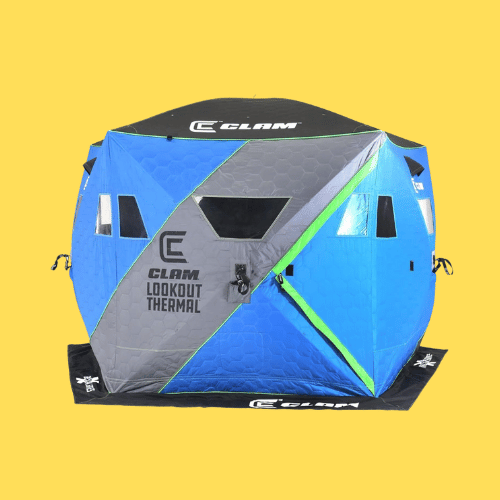
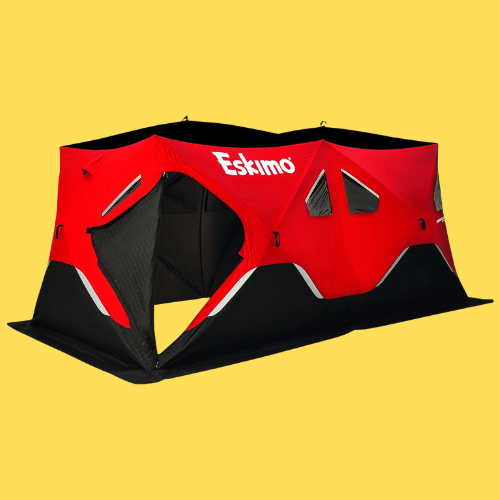
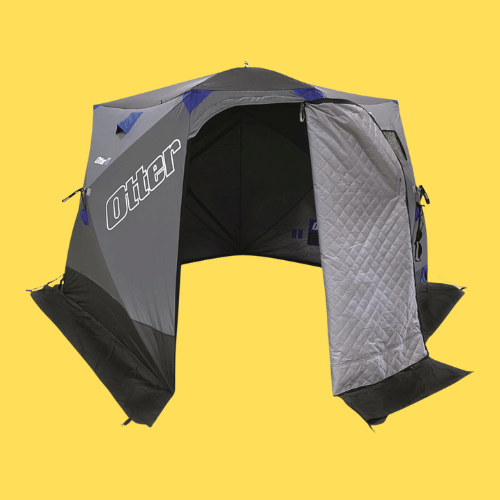
🥪 Food & Drink Storage for Ice Fishing
Keeping your food and drinks warm and fresh during Ice Fishing is tricky. Cold weather can freeze liquids and make certain foods hard to eat.
🥤 Best Ways to Keep Drinks Warm
- Use an insulated thermos for coffee, tea, or hot soup.
- Bring a small camp stove for reheating food.
- Avoid plastic water bottles—they can freeze quickly.
🍽️ Best Foods for Ice Fishing Trips
- Hot soups & stews (Pre-packed in a thermos)
- Energy bars & nuts (Quick & easy to eat)
- Jerky & dried meat (High-protein snack)
- Sandwiches (Wrapped in foil for insulation)
✅ Pro Tip: Pack extra snacks! Ice Fishing burns a lot of calories, so you’ll need extra energy.
🛠️ Organizing Your Ice Fishing Gear Like a Pro
A well-organized setup saves time and keeps your gear safe. Here’s how to transport and store your equipment efficiently.
🎒 Best Ice Fishing Storage & Transport Solutions
- Sleds: Large sleds help carry heavy gear across the ice (Shappell Jet Sled is a top choice).
- Tackle Boxes: Keep lures, hooks, and small gear organized (Plano Guide Series Tackle Box).
- Rod Holders: Protects rods from damage and makes fishing easier (HT Enterprises Ice Rod Holder).
- Insulated Bait Buckets: Keeps live bait fresh for longer (Frabill Insulated Bait Bucket).
✅ Pro Tip: Pack light but efficiently—only bring the gear you’ll actually use to avoid clutter.
Secret 5: Top Ice Fishing Destinations Around the World 🌍
If you’re looking for the best places to experience Ice Fishing, these locations offer world-class fishing opportunities:
Lake of the Woods, Minnesota, USA
🎣 Known as the “Walleye Capital of the World,” this lake offers incredible Ice Fishing opportunities for walleye, sauger, and perch.
Lake Winnipeg, Manitoba, Canada
🐟 Home to monster greenback walleye, this lake is a favorite among experienced Ice Fishers.
Lake Vänern, Sweden
❄️ One of Europe’s largest lakes, famous for huge pike and perch Ice Fishing.
Inari Lake, Finland
🏔️ A remote and scenic Arctic location with fantastic fishing for trout and Arctic char.
Lake Baikal, Russia
🌊 The deepest lake in the world, offering unique Ice Fishing for Baikal omul fish.
✅ Pro Tip: Always check local regulations before fishing—some locations require special licenses.
By using these comfort and organization tips, you can turn your Ice Fishing trip into an enjoyable, hassle-free adventure. In the next section, we’ll wrap up the guide with expert tips, final advice, and a call to action! 🎣
Secret 6: Expert Tips & Final Advice for Ice Fishing Success 🎯
Now that you have all the essential Ice Fishing gear, know how to stay warm and comfortable, and have discovered some of the best Ice Fishing destinations worldwide, it’s time for the final expert tips to make your experience even more successful.
In this final section, we’ll cover:
✅ How to avoid common Ice Fishing mistakes
✅ Final checklist before heading out
🚫 Common Ice Fishing Mistakes & How to Avoid Them
Even experienced anglers make mistakes! Avoid these common Ice Fishing errors to stay safe and catch more fish.
❌ Mistake #1: Fishing in the Wrong Spot
🔹 Solution: Use a depth finder and fish near structures where fish gather.
❌ Mistake #2: Using Too Heavy a Line
🔹 Solution: Ice Fishing requires thin, sensitive lines (2-6 lb test) for better bite detection.
❌ Mistake #3: Not Checking Ice Safety
🔹 Solution: Always test ice thickness before stepping on the ice and carry safety gear.
❌ Mistake #4: Not Changing Bait or Lure Often Enough
🔹 Solution: If fish aren’t biting, switch bait every 15-30 minutes until you find what works.
❌ Mistake #5: Being Too Noisy
🔹 Solution: Walk carefully on the ice and avoid loud noises that could scare fish away.
✅ Pro Tip: Keep a fishing journal! Tracking locations, bait, and conditions can help you refine your strategy over time.
✅ Final Checklist: What to Bring for a Successful Ice Fishing Trip?
Before heading out, double-check your gear to avoid surprises on the ice!
🛑 Safety Gear: Ice picks, throw rope, flotation suit, first aid kit
🎣 Fishing Equipment: Rods, reels, tackle box, bait, tip-ups
🏕️ Shelter & Warmth: Ice Fishing shelter, propane heater, thermal clothing
🍲 Food & Drinks: Insulated thermos, energy snacks, extra water
📱 Navigation & Tools: GPS, depth finder, auger, sled for carrying gear
✅ Pro Tip: Tell someone where you’re going and when you’ll return—safety first!
Final Thoughts: Why Ice Fishing is Worth Trying? 🏁
Ice Fishing isn’t just about catching fish—it’s an adventure that combines patience, skill, and the thrill of winter fishing. Whether you’re fishing alone or with friends, it’s a unique way to experience nature in a completely different way.
By following this guide, you now have:
- The best Ice Fishing gear recommendations
- Proven techniques for catching more fish
- Essential safety tips for staying safe on the ice
- A list of top Ice Fishing destinations worldwide
🎯 Now it’s your turn! Plan your first (or next) Ice Fishing trip, and put these tips into action!
💬 Do you have a favorite Ice Fishing spot or tip? Share your thoughts in the comments! 🎣❄️
🚀 Happy Ice Fishing & Tight Lines! 🎣🔥

